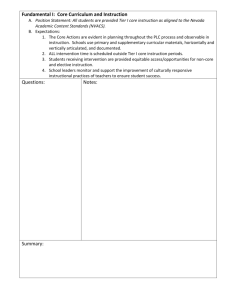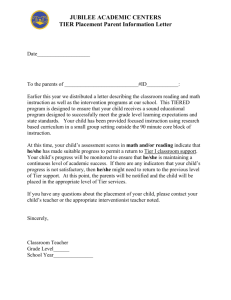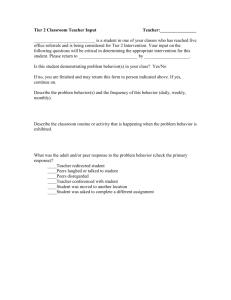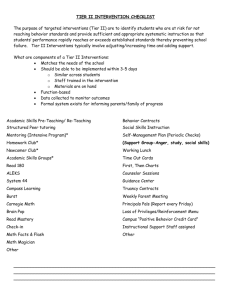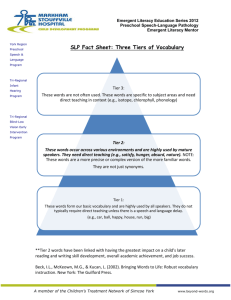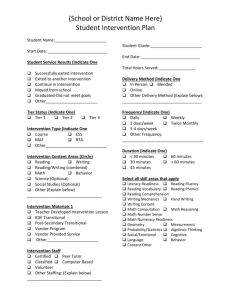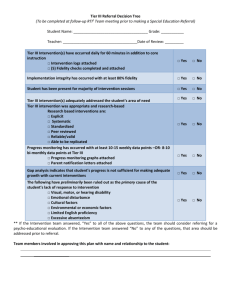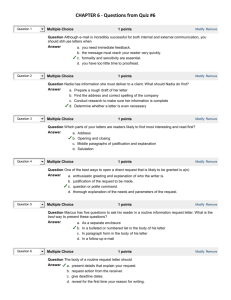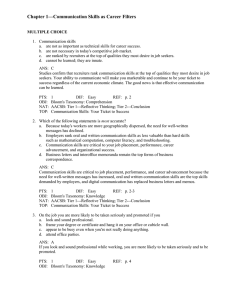BUS260 Chapter 6 Quiz ANSWERS
advertisement
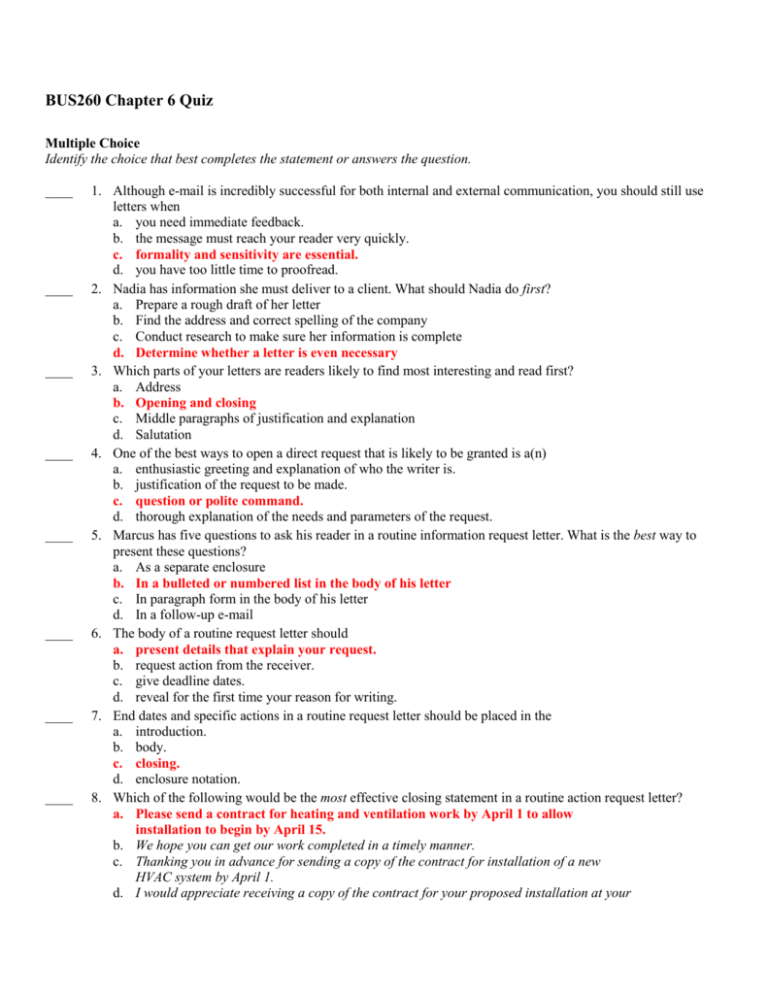
BUS260 Chapter 6 Quiz Multiple Choice Identify the choice that best completes the statement or answers the question. ____ ____ ____ ____ ____ ____ ____ ____ 1. Although e-mail is incredibly successful for both internal and external communication, you should still use letters when a. you need immediate feedback. b. the message must reach your reader very quickly. c. formality and sensitivity are essential. d. you have too little time to proofread. 2. Nadia has information she must deliver to a client. What should Nadia do first? a. Prepare a rough draft of her letter b. Find the address and correct spelling of the company c. Conduct research to make sure her information is complete d. Determine whether a letter is even necessary 3. Which parts of your letters are readers likely to find most interesting and read first? a. Address b. Opening and closing c. Middle paragraphs of justification and explanation d. Salutation 4. One of the best ways to open a direct request that is likely to be granted is a(n) a. enthusiastic greeting and explanation of who the writer is. b. justification of the request to be made. c. question or polite command. d. thorough explanation of the needs and parameters of the request. 5. Marcus has five questions to ask his reader in a routine information request letter. What is the best way to present these questions? a. As a separate enclosure b. In a bulleted or numbered list in the body of his letter c. In paragraph form in the body of his letter d. In a follow-up e-mail 6. The body of a routine request letter should a. present details that explain your request. b. request action from the receiver. c. give deadline dates. d. reveal for the first time your reason for writing. 7. End dates and specific actions in a routine request letter should be placed in the a. introduction. b. body. c. closing. d. enclosure notation. 8. Which of the following would be the most effective closing statement in a routine action request letter? a. Please send a contract for heating and ventilation work by April 1 to allow installation to begin by April 15. b. We hope you can get our work completed in a timely manner. c. Thanking you in advance for sending a copy of the contract for installation of a new HVAC system by April 1. d. I would appreciate receiving a copy of the contract for your proposed installation at your ____ 9. ____ 10. ____ 11. ____ 12. ____ 13. ____ 14. ____ 15. ____ 16. earliest convenience. Jessica is following the three-part plan to write a direct claim letter about a problem with her wireless service. What should she put in her opening? a. A clear description of the desired action b. An explanation of the nature of her problem with the cell phone service c. A goodwill statement and end date d. Details of the adjustment she desires You can improve the effectiveness of a direct claim letter by a. using a few threatening words to get your point across. b. providing a detailed timeline of what happened and the specific person who is to blame for the problem. c. explaining the problem with necessary details. d. including a subtle reference to your attorney or to the Better Business Bureau. Harland is following the three-step writing plan for his direct claim letter. In the body of the letter, Harland should a. assume the company understands his request without explanation. b. use emotional language to show how upset he is about the situation. c. assume the company purposely tries to cheat its customers. d. include copies of all pertinent documents. In the closing of a claim letter, you should a. justify and explain your request. b. promote goodwill and summarize your request. c. reference all copies of pertinent documents enclosed. d. warn the company that failure to comply could cause legal action. A subject line in a direct reply letter a. is mandatory. b. generally refers in abbreviated form to previous correspondence and/or summarizes a message. c. must be written as a complete sentence. d. identifies the sender and his or her company. Which of the following is the most effective opening sentence for a direct reply letter? a. Your letter of June 23, in which you sought information about our corporate travel packages, has been referred to me for reply. b. This is to inform you that we received your letter of June 23 seeking information about our corporate travel packages. c. Yes, we can put together a corporate travel package that will meet your needs and fit your budget. d. Thank you so much for your interest in our corporate travel packages. Which of the following is not a goal when writing adjustment letters? a. To gain the confidence of the customer b. To gain thorough documentation to prove that the customer has presented an honest claim c. To rectify the wrong d. To promote future business and goodwill Which of the following is the most appropriate opening for an adjustment letter granting a claim? a. We are very sorry to hear that your meal with us did not meet your expectations. b. Thank you for your letter of November 16, in which you described the problems you experienced while dining with us last weekend. c. Although we believe that the food we served last weekend was of the highest quality, we ____ 17. ____ 18. ____ 19. ____ 20. are willing to refund the cost of your dinner this time only. d. The enclosed check for $78, which covers the cost of your dinner, demonstrates our desire to satisfy our customers and earn their confidence. Which of the following represents the most appropriate apology for an adjustment letter? a. We understand your reliance on a high performance router and apologize for the incomplete installation of your DataServe router. b. We are sorry for any inconvenience this may have caused. c. We regret the error that caused the system failure you claim on your DataServe router. d. It is unfortunate that your DataServe router has failed, and we promise that this failure will not occur again. The closing of an adjustment letter should a. guarantee that the problem will not recur if the customer continues doing business with you. b. express confidence in future business relations. c. assign blame to the responsible department and assure the reader that the department has been improved. d. remind readers of their responsibility in the product failure. Goodwill messages should be short, selfless, specific, spontaneous, and a. sassy. b. sincere. c. spiritual. d. suave. Which of the following would be least effective in a sympathy note? a. We are deeply saddened, Nathan, to learn of the death of your wife. b. Rebecca's generous nature and volunteer efforts for the Red Cross endeared her to many. c. If we may help you or lighten your load in any way, you need only call. d. If I may be of any help, please do not hesitate to contact me. BUS260 Chapter 6 Quiz Answer Section MULTIPLE CHOICE 18. ANS: B It is not appropriate to guarantee that the problem will not recur, to blame other company employees, or to suggest that the readers are responsible. Instead, you should mention the product favorably and express appreciation for the customer's business. These strategies are both professional and appropriate. PTS: 1 DIF: 3 REF: p. 144 OBJ: TYPE: Conceptual NAT: AACSB: Tier 1-Communication; Tier 2-Rhetorical considerations | AACSB: Tier 1-Reflective Thinking; Tier 2-Conclusion TOP: Show Confidence and Helpfulness in the Closing 19. ANS: B Goodwill messages should adhere to the five Ss, which means they should be short, selfless, specific, spontaneous, and sincere. PTS: 1 DIF: 3 REF: p. 145 OBJ: TYPE: Conceptual NAT: AACSB: Tier 1-Communication; Tier 2-Rhetorical considerations | AACSB: Tier 1-Reflective Thinking; Tier 2-Conclusion TOP: Goodwill Messages 20. ANS: D One message lacks sincerity: If I may be of any help, please do not hesitate to call me. An effective sympathy note is sincere and uses words that show you understand what a crushing blow the misfortune is. PTS: 1 DIF: 5 REF: p. 147-148 OBJ: TYPE: Application NAT: AACSB: Tier 1-Communication; Tier 2-Rhetorical considerations | AACSB: Tier 1-Reflective Thinking; Tier 2-Analysis, Conclusion TOP: Conveying Sympathy
